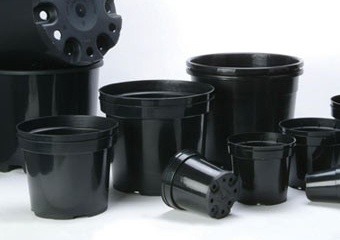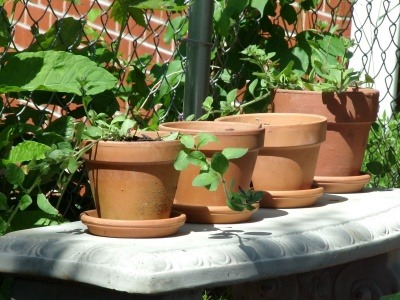Can you recycle plant pots?

A national plant pot take-back scheme has been launched by the Horticultural Trade Association (HTA), which will enable its members to send trays and pots for recycling.
There are an estimated 500 million plastic plant pots in circulation every year, according to Which?Gardening; most gardeners and hobbyists will admit to hoarding far too many pots in the garden shed, just like many of us do with single-use plastic bags. According to the Waste and Resources Action Programme (WRAP), 73 per cent of local authorities do accept rigid plastic packaging (pots, tubs and trays) in kerbside collections, but within this many still reject plastic flower pots, in part because they may contain soil and other organics that contaminate the loads.
Moreover, plant pots are still often made from a wide range of plastics, including the ubiquitous black plastic, which is rejected at the kerbside and by most reprocessors because standard sorting machines struggle to detect the carbon pigment used to colour it.
None of the large home improvement and garden centre chains like Homebase or B&Q offer recycling schemes, and both Notcutts and Wyevale garden centres have scrapped their take-back services, citing an inability to find a national reprocessor able to cope with the wide variety of different plastics used in pot manufacturing.
Now, the HTA, which counts around 1,800 garden centres across the UK as members, has launched a scheme it says will not only enable members to become more sustainable but will also save them money – and could even help them turn a profit.
The service is offered in partnership with Hampshire-based Ecogen Recycling, who will accept pallets of plastic trays and pots or collect them direct from members for a set haulage fee. They are also accepting larger amounts of mixed recyclable materials (including hard plastic, plastic wrap and cardboard), and if the material is of a high quality the provider could get some money back. The HTA is also negotiating a national deal to provide bailers for members who have larger amounts of material to dispose of, to help minimise haulage costs.
The HTA hopes that more of its members will now be able to offer take-back services to customers in the knowledge that there is a specific destination for the plastic pots. Ecogen repelletises the plastics to prepare the material for input into new products.
Commenting on the launch of the scheme, Martin Simmons, HTA Director of Operations, said: “Plastics and recycling have become even higher on the national agenda since the coverage on Blue Planet II showing how waste plastic impacts our natural world. Within the garden industry we do have a responsibility to recycle what we currently use, as well as develop innovative alternative solutions.
“This is an issue that we take very seriously, as do our members and their customers. Whilst plastic recycling has been more economical for our larger members this is the first time that we have been able to offer a national recycling solution for members of all sizes.”

Progress is being made elsewhere towards the wider recycling of plastic pots: in February, Aeroplas, which produces plastic containers for the horticultural industry, launched a range of carbon-free polypropylene plant pots which it says are completely suitable for kerbside recycling. Tests proved that eight different colours of plastic, including black, were able to be correctly detected by sorting machines.
Stuart Foster, CEO of plastics recycling charity RECOUP, commented on the new range: “It is now for the rest of industry to adopt the same principles...This is Aeroplas saying to the leadership that an ideal solution for an industry roll-out of pot collections is needed, alongside UK local authorities changing the message it delivers to recyclers to explain that plant pots can be recycled.
“[The new range] doesn’t resolve all issues at once but does help show that at least some plant pots can be recycled effectively.”
There are also alternatives to using plastic pots. Biodegradable plant pots break down naturally over time so can be cut up and added to compost or planted straight into the ground, where they will break down in around three years. Wood fibre or coir (coconut husk) pots provide a further option, with the added benefit of being made from what would otherwise be a waste material.
While the recycling of plastic pots is becoming more widely available, there is little that can be done with broken ceramic and terracotta pots. Pieces of broken pottery can be useful in creating a drainage layer in the bottom other plant pots, but failing that, they have to go into residual waste (wrapped so as not to tear the bag or injure the collector).
More information about the HTA scheme can be found on the organisation’s website.









